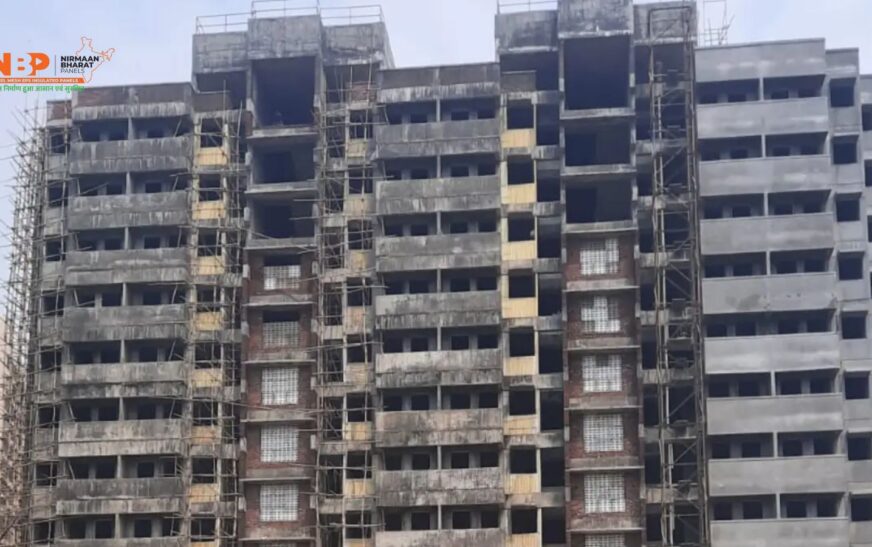Expanded Polystyrene (EPS) panels are revolutionizing the construction industry with their superior insulation properties, cost-effectiveness, and environmental benefits. Used extensively in both residential and commercial buildings, EPS panels offer a smart and sustainable alternative to traditional building materials. In India, the growing demand for energy-efficient and eco-friendly solutions has made EPS panels increasingly popular. In this blog, we will explore the numerous benefits of EPS panels, their applications, and their growing prominence in India.
What Are EPS Panels?
EPS panels are a type of prefabricated building material made from Expanded Polystyrene foam sandwiched between two layers of concrete or plasterboard. These panels are lightweight, durable, and versatile, making them ideal for a wide range of construction projects. EPS panels are used for walls, roofs, ceilings, and floors, offering both thermal insulation and soundproofing properties. Their versatility makes them suitable for use in residential, commercial, and industrial buildings.
Key Benefits of EPS Panels for Construction in India
- Excellent Thermal Insulation
EPS panels are renowned for their superior thermal insulation properties. In a country like India, where temperatures can soar in summer and drop in winter, maintaining a comfortable indoor environment is essential. EPS panels provide an effective barrier against heat transfer, keeping interiors cool in the summer and warm in the winter. This results in energy savings as the need for air conditioning and heating is reduced, leading to lower electricity bills. - Cost-Effective Construction Material
One of the main advantages of EPS panels is their cost-effectiveness. Due to their lightweight nature, they are easier and cheaper to transport, reducing overall transportation costs. Additionally, EPS panels have lower installation costs compared to traditional construction materials like brick and concrete. Their fast and easy installation reduces labor costs and construction time, making them an economical choice for builders and developers. - Lightweight and Easy to Handle
Unlike traditional construction materials, EPS panels are incredibly lightweight, which makes them easier to handle and install. This reduces the labor required on-site and speeds up the construction process. Additionally, the reduced weight of EPS panels helps in minimizing the load on the building structure, making them ideal for high-rise buildings and projects where load-bearing capacity is a concern. - Improved Sound Insulation
EPS panels also offer excellent soundproofing properties. The foam core of the panels acts as a sound barrier, preventing noise from traveling between rooms or from the outside. This is particularly beneficial in urban environments where noise pollution can be a significant issue. By incorporating EPS panels in your building’s walls or ceilings, you can create a quieter, more peaceful indoor environment. - Eco-Friendly and Sustainable
In today’s world, environmental sustainability is a top priority, and EPS panels offer a more eco-friendly construction option. Made from non-toxic and recyclable materials, EPS panels contribute to reducing waste in the construction industry. The energy-efficient nature of EPS panels also helps reduce carbon emissions by lowering the need for energy-intensive heating and cooling. Choosing EPS panels for your construction project is a step towards promoting sustainability. - Fire Resistant
EPS panels are fire-resistant, adding a layer of safety to buildings. They are designed to withstand high temperatures without easily catching fire. EPS panels used in construction typically have a fire-resistant coating, ensuring that the material will not contribute to the spread of flames during a fire. This makes them a safer choice for residential, commercial, and industrial applications. - Moisture Resistant
EPS panels are highly resistant to moisture, making them ideal for use in areas with high humidity or regions that experience heavy rainfall. Unlike traditional materials like wood, EPS does not absorb water, preventing the growth of mold and mildew. This makes EPS panels an excellent choice for buildings in coastal areas or regions prone to water damage.
EPS Panels in India: A Growing Trend
In recent years, the demand for EPS panels in India has been on the rise. With a booming construction industry and an increasing focus on sustainable building materials, EPS panels have emerged as a top choice for builders and developers across the country. The need for energy-efficient and cost-effective solutions drives the Indian market in both residential and commercial buildings.
EPS panels are widely used in modern construction projects, from high-rise buildings to low-cost housing developments. They are also used in infrastructure projects like highways, bridges, and industrial buildings. Their ability to reduce construction time, cost, and energy consumption makes them an attractive option for the Indian construction sector.
Factors Affecting EPS Panel Price in India
When considering EPS panels for construction, one of the most important factors to consider is the price. The cost of EPS panels in India varies depending on several factors:
- Quality and Brand: The quality of EPS panels and the reputation of the manufacturer play a significant role in determining the price. High-quality EPS panels from well-established brands will generally be more expensive, but they offer better durability and performance.
- Size and Thickness: EPS panels come in various sizes and thicknesses, and the price can vary depending on the dimensions required for your project. Thicker panels generally offer better insulation but may come at a higher cost.
- Quantity Ordered: Bulk purchases often result in a lower price per unit. If you are buying EPS panels for a large construction project, you may be able to negotiate a better deal with the supplier.
- Customization: If you require customized EPS panels for a specific project, the price may increase. Custom shapes, sizes, or finishes will add to the cost.
How to Choose the Right EPS Panels for Your Construction Project
Choosing the right EPS panels for your project depends on several factors, including the type of building, the required insulation levels, and your budget. Here are a few tips to help you make the right choice:
- Determine the Insulation Needs: Different types of buildings require different insulation levels. Consider factors like climate, location, and the building’s intended use when selecting EPS panels.
- Consider Fire Safety Standards: Ensure that the EPS panels you choose meet the required fire safety standards for your region. Fire-resistant EPS panels are essential for ensuring the safety of your building.
- Check the Manufacturer’s Reputation: Look for a reputable supplier or manufacturer of EPS panels. A trusted brand will offer high-quality materials, excellent customer service, and reliable warranties.
- Request Multiple Quotes: Get quotes from multiple suppliers to compare prices and find the best deal. Be sure to ask about the EPS panel price in India, delivery charges, and installation services.
Conclusion
EPS panels are rapidly gaining popularity in India as a versatile, cost-effective, and sustainable solution for modern construction. Their numerous benefits, including excellent thermal insulation, lightweight properties, soundproofing, and eco-friendliness, make them an ideal choice for both residential and commercial buildings. As the demand for energy-efficient and sustainable construction grows in India, EPS panels are poised to play a key role in the country’s building industry. By understanding the benefits of EPS panels and considering factors such as EPS panel price in India, you can make an informed decision for your next construction project. Embrace the future of construction with EPS panels and build smarter, greener, and more energy-efficient buildings.
read more










4 Comments
Профессиональный сервисный центр по ремонту бытовой техники с выездом на дом.
Мы предлагаем:сервис центры бытовой техники москва
Наши мастера оперативно устранят неисправности вашего устройства в сервисе или с выездом на дом!
¡Hola seguidores del casino !
Con 100 giros gratis puedes acceder a slots populares sin pagar nada. Cada tirada puede traerte grandes premios. Solo necesitas registrarte.
Solicita 12e de dinero gratis sin necesidad de depГіsito – 100 euros gratis sin deposito.
¡Que tengas magníficas victorias memorables !
¡Hola expertos del azar !
¿Quieres jugar sin arriesgar tu dinero? Obtén 25 giros gratis sin depósito en España y descubre tus juegos favoritos sin pagar nada. Solo por registrarte, ya puedes empezar a ganar.​
La mayorГa de los nuevos usuarios califican para esta oferta exclusiva https://25girosgratissindeposito.xyz desde el primer dГa.
¡Que tengas magníficas recompensas fantásticas !
¡Hola, usuarios de apuestas en línea !
Un bono de 10 euros gratis te brinda la oportunidad de ganar sin haber invertido nada.
Muchos jugadores buscan constantemente formas de obtener 10 euros gratis sin depГіsito al registrarse. Esta bonificaciГіn suele estar disponible solo por tiempo limitado, lo que la hace aГєn mГЎs atractiva. Aprovechar estas oportunidades puede marcar la diferencia en tu experiencia de juego.
Solo por registrarte: juega con 10€ gratis – https://www.youtube.com/@squeezer007
¡Que tengas excelentes sesiones de juego !